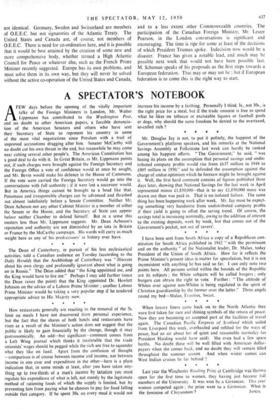A SPECTATOR'S NOTEBOOK A FEW days before the opening of the
vitally important talks of the Foreign Ministers in London, Mr. Walter Lippmann has contributed to the Washington Post, and no doubt to other American papers, a forcible denuncia- tion of the American Senators and others who have sent their Secretary of State to represent his country in some of the most vital negotiations since Potsdam with a trail of unproved accusations dragging after him. Senator McCarthy will no doubt cut his own throat in the end, but meanwhile he may come near cutting several other people's. The American Constitution has a good deal to do with it. In Great Britain, as Mr. Lippmann points out, if such charges were brought against the Foreign Secretary and the Foreign Office a vote of confidence would at once be sought, and Mr. Bevin would make his defence in the House of Commons. If the vote were carried the Foreign Secretary would go into the conversations with full authority ; if it were lost a successor would. But in America things cannot be brought to a head like that. Poisonous and irresponsible charges can be advanced and thrashed out almost indefinitely before a Senate Committee. Neither Mr. Dean Acheson nor any other Cabinet Minister is a member of either the Senate or the House, and the Secretary of State can appear before neither Chamber to defend himself. But in a sense this matters less than Mr. Lippmann suggests. Mr. Dean Acheson's reputation and authority are not diminished by an iota in Britain or France by the McCarthy campaign. His words will carry as much weight here as any of his predecessors' in history ever have.






































 Previous page
Previous page